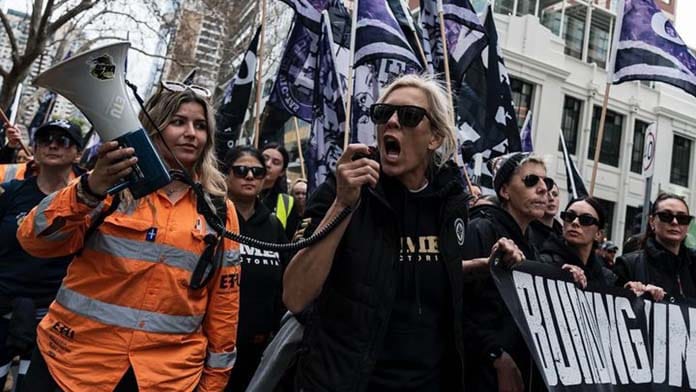Albanese’s right-wing agenda is bringing Labor unstuck. There is a widespread sense that he is running a useless government that is failing working class people.
Labor’s failure to act on the cost of living crisis has generated massive frustration.
Despite falling inflation, hopes of an interest rate cut have been dashed, with Reserve Bank chief Michele Bullock declaring there was no relief coming in the “near term”.
There is even dismay with the government from mainstream Labor figures. Former ACTU Secretary Bill Kelty has accused the government of being “mired in mediocrity” while Gareth Evans questioned “what exactly is this Labor government for?”
Labor is also facing defeat in the Queensland state election on 26 October, with the likelihood of a right-wing LNP government committed to a crackdown on youth offenders and the unions.
Albanese has taken a conservative course ever since his election, avoiding any serious change and serving the interests of big business and the rich.
His union busting attack on the CFMEU—aimed at weakening militant unionism—is the most recent example.
While the government talks about climate action it has also just approved another three coal mines.
Even as Israel expands its war into Lebanon, it still refuses to take any action. The export of parts for the F-35 fighter jets that Israel is using to bomb residential areas in Beirut continues.
It has also dug in to defend the $368 billion AUKUS nuclear subs, with Deputy Prime Minister Richard Marles dismissing opposition to declare, “it is happening”.
Perth recently hosted the country’s first maintenance visit by a US nuclear submarine.
And Labor is still competing with Peter Dutton to cut immigration, feeding the racist scapegoating of migrants for the rising cost of living. Labor is trumpeting its reduction in the number of international students coming here and boasting about its rejection of 70 per cent of the Palestinians from Gaza who have applied to come here since October.
Albanese’s housing plans are another set of timid policies that will do nothing to bring down prices. His “Help to Buy” scheme would help only 10,000 people, and would help push up prices for everyone else. The “Build the Rent” policy would give tax breaks to investors to encourage them to build houses to rent. But only 10 per cent would be affordable housing.
If the government was serious about housing affordability it would simply invest in building homes to massively boost the supply of public housing.
There have been reports that the government is finally considering changes to negative gearing for property investors, which has driven up housing prices beyond what most people can afford.
This is a policy Labor took to the 2019 election and then dumped. Change is desperately needed, but anything Labor backs is likely to fall short of what’s needed to make housing affordable.
Building resistance
Labor is likely to lose seats at the election due by May next year. But we shouldn’t put our hopes in minority government involving independent MPs or The Greens.
We need resistance now. If the government gets away with weakening the CFMEU, other unions will be less willing to stage disruptive strike action or defy the law—making industrial action less effective and handing more power to the bosses.
The movement for Palestine will also be weaker, with fewer unions willing to support the protests or back community pickets and political stopwork action.
The two days of stopwork action staged by construction unions have sent a message that the CFMEU is still willing to fight.
Opposition to the attack on the CFMEU is growing within the union movement, with more unions coming out against the administration.
The national Communications Electrical and Plumbers Union (CEPU) is even withholding Labor Party affiliation fees and has disaffiliated from the ACTU.
But too many union leaders have supported the ACTU and gone along with Labor’s attack. Every unionist needs to build support for the CFMEU in their workplace or union branch.
Israel’s escalation in Lebanon also puts renewed focus on Albanese’s support for Israel.
Over the last year the movement has built a much larger base of support for Palestine—as the hundreds of students that continue to flock to Student General Meetings show. But there is still a long way to go to win over the majority to side with Palestine, and to turn the sentiment into a movement that can break ties with Israel.
We need a bigger layer of activists working to deepen the support for Palestine and counter the pro-Israel media bias.
It’s organising and resistance on the streets and in the workplaces that can increase the pressure on Albanese, defend union rights and break Australia from support for Israel and US imperialism.






